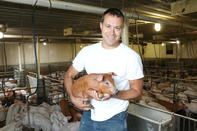Abdominal Pain
Abdominal pain in pigs may be caused by stomach ulcers, organ displacement, constipation and some diseases, such as African swine disease.

Signs include pigs arching their back in pain, moaning, groaning and or screaming. Of the digestive problems in pigs, diarrhoea is the most serious. In this section, abdominal pain, stomach ulcers and vomiting are discussed. Read more on Diarrhoea in Pigs in a separate article. Treatment To treat abdominal pain, a farmer needs to identify the cause of the pain and then treat that.
Stomach Ulcers
Signs that a pig may be suffering from stomach ulcers include vomiting, abdominal pain and or dung that contains dark brown digested blood that looks like coffee grounds. Grower pigs are more often affected by this condition than sows. Stomach ulcers may develop for various reasons.
According to The Pig Site article, Gastric Ulcers, the diet may not contain enough protein, fibre or zinc. Alternatively, the energy level of the ration may be too high or the ration may contain too much wheat or unsaturated fats. The pigs may also be suffering from nutritional deficiencies, such as a shortage of vitamin E or selenium.
When it comes to the physical feed, the particle size of the feed ingredients may be too small or the moisture content of the cereals component of the diet may be too high. Transportation, periods of starvation, irregular feeding patterns and poor availability of water may also contribute to the problem.
Treatment Stomach ulcers can be prevented by feeding pigs a balanced diet, with the feeding ingredients not being too fine. The South African Pork Producer’s Organisation (SAPPO) in its pork production manual Pigs for Profit, advises farmers to treat pigs by adding 50% bran to the feed, giving the pigs access to green feed, such as lucerne or grass, and injecting them with a potentiated sulphonamide (Trimethoprim).
Vomiting
Pigs may start vomiting for various reasons, some causes being more serious than others. They, for example, may have stomach ulcers, be ill, have eaten something toxic or that has upset their stomachs or suffer from an internal obstruction or a nutrient deficiency.
Treatment Good hygiene will go a far way in helping to prevent vomiting. Care should be taken to prevent poisoning. The salt content in feed should be restricted and pigs should have access to sufficient water, to prevent salt poisoning. The cause of the vomiting should be treated. So if not sure, consult a veterinarian or animal health technician.
The American Minim Pig Association suggests farmers withhold feed for at least six hours after a pig has vomited to let the stomach rest and limit the water intake to about half a cup an hour after the last vomit.
Free access to water can be restored if there has been no vomiting for six hours. Food should be slowly reintroduced back into the diet, starting with soft food for about a week before the pig is returned to a normal diet.
By Glenneis Kriel